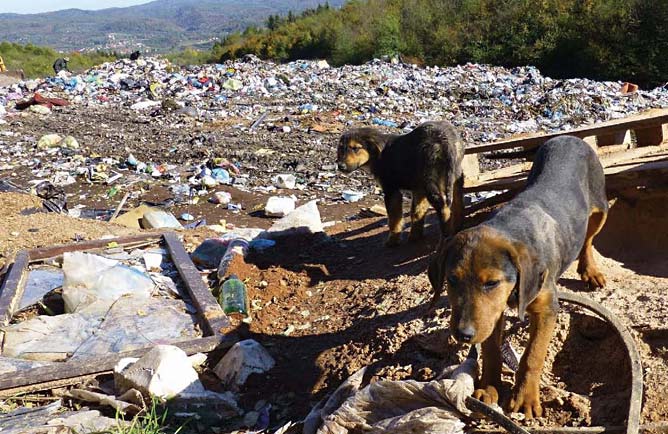Written by Lara Johnson on .
Compassion and support are what’s needed to help Bosnia’s people and its dogs, argues Stephen Jenkinson.
At face value, Bosnia’s dogs should have a bright future. Its 2009 animal welfare legislation makes UK laws look decidedly inept. Shock collars — banned; de-barking — banned; euthanasia of healthy dogs — banned. Bosnia has great aspirations.
But in practice, that ‘no kill’ law means Bosnia’s street dogs increasingly face a confined life sentence in a shelter, or a clandestine death that is at best unlawful, and at worst prolonged and immensely cruel. Unlike in the UK, there’s no culture of adopting dogs from shelters in Bosnia; if you want a puppy, you can readily pick one up on the street or from a neighbour. I recently visited Bosnia for a two-day workshop discussing how local communities could help the stray dog problem.
An unknown future
Some street dogs have a good life — certainly more fulfilled and happy than many bored and ignored family pets in the UK. Some are part of the community and often very well socialised and fed. Many are family pets who are allowed to roam during the day, or at night, as the owners see fit.
But for many other street dogs, welfare and life expectancy is poor. The puppies I saw scavenging for food at the council dump might already be dead. Many countries like Bosnia have always had street dogs. But the United Nation’s community forums have identified Bosnia’s thousands of street dogs as a threat to safety and security. Local people are genuinely concerned about attacks on themselves and their children, quite apart from the nuisance and danger of dogs chasing cars and bikes.
Something has to be done. But charities like the International Fund for Animal Welfare (IFAW) fear that if politicians opt for a dog cull, it will legitimatise all sorts of inhumane home-spun killing, such as drowning, electrocution, and the injection of household chemicals into dogs’ lungs. But the most tragic aspect of a cull is that the suffering is pointless. Street dog numbers will increase again, unless the source of the problem is addressed.
Community work
The IFAW is working with the United Nations Development Programme (UNDP) in Bosnia to develop more effective and long-term solutions, by helping local communities identify and address where these dogs are coming from.
This was a pilot project and IFAW wanted honest, independent advice to ensure their supporters’ donations were well spent. And so I joined the IFAW and UNDP teams at a two-day workshop in the small town of Sanski Most, in the west of Bosnia. It seemed like everyone in the community was there: vets, teachers, policemen, welfare advocates, hunters, and farmers. It was inspiring to see so many people giving two days of their time to discuss how to build a community that’s as good for dogs as it is for people.
Especially here, where less than 20 years ago people were forced to flee their homes, or forced into concentration camps in neighbouring towns. People certainly had different views. But when dog killing was raised, the deafening silence made it clear that no one wanted that. As one participant said, without objection: “The dogs’ problem is our problem”.
The people of Sanski Most will soon be gathering again for the second IFAW workshop, to set out and agree a humane and effective local dog control plan. This is badly needed, as I saw the day before I flew home, at one of the council-funded, privately run dog shelters near Sarajevo.

A safe shelter?
At Sanski Most, the UN translators often said ‘dog asylum’ instead of ‘dog shelter’, and, in truth, that was a far more accurate description of this shelter and many like it. The dogs were locked away, out of sight, with little chance of leaving. The shelter was truly horrific. I take no pleasure in saying that humane euthanasia would have been the kindest thing for these dogs, but that’s presently illegal.
Dogs were shut in faeces-strewn disused toilet cubicles, or chained to outdoor kennels 24 hours a day. Several dogs had ear tags showing they’d been neutered and vaccinated by well-meaning visiting charities from western Europe. But treating dogs already on the street doesn’t stem the tide of ever-more street dogs. They are simply a symptom of the bigger problem that IFAW’s approach is working to address.
 Yet as ever in Bosnia, humanity was still there. From the motorway flyover behind the asylum, a road worker threw boxes of bread into the enclosures. And so to vilify the people or government of Bosnia en masse for the current situation would be unfair and unhelpful. Especially as the UK is still lawfully killing around 9,000 stray dogs each year.
Yet as ever in Bosnia, humanity was still there. From the motorway flyover behind the asylum, a road worker threw boxes of bread into the enclosures. And so to vilify the people or government of Bosnia en masse for the current situation would be unfair and unhelpful. Especially as the UK is still lawfully killing around 9,000 stray dogs each year.Support is needed
The 2009 animal welfare law and all the people I met show that Bosnia really does want to do the right thing. Otherwise, why would a country still littered with land mines and scarred by the atrocities and economic austerity of a civil war, bother about dogs?
What Bosnia and its people need is our compassion and support. And it is truly ground-breaking for the UNDP to be working with IFAW to make life better for dogs, by making life better for people.
The people in Sanski Most have the commitment, opportunity, and now the support, to show there’s a better way forward for communities all over the world — for people and dogs.


Yeah really like to adopt one.
ReplyDelete